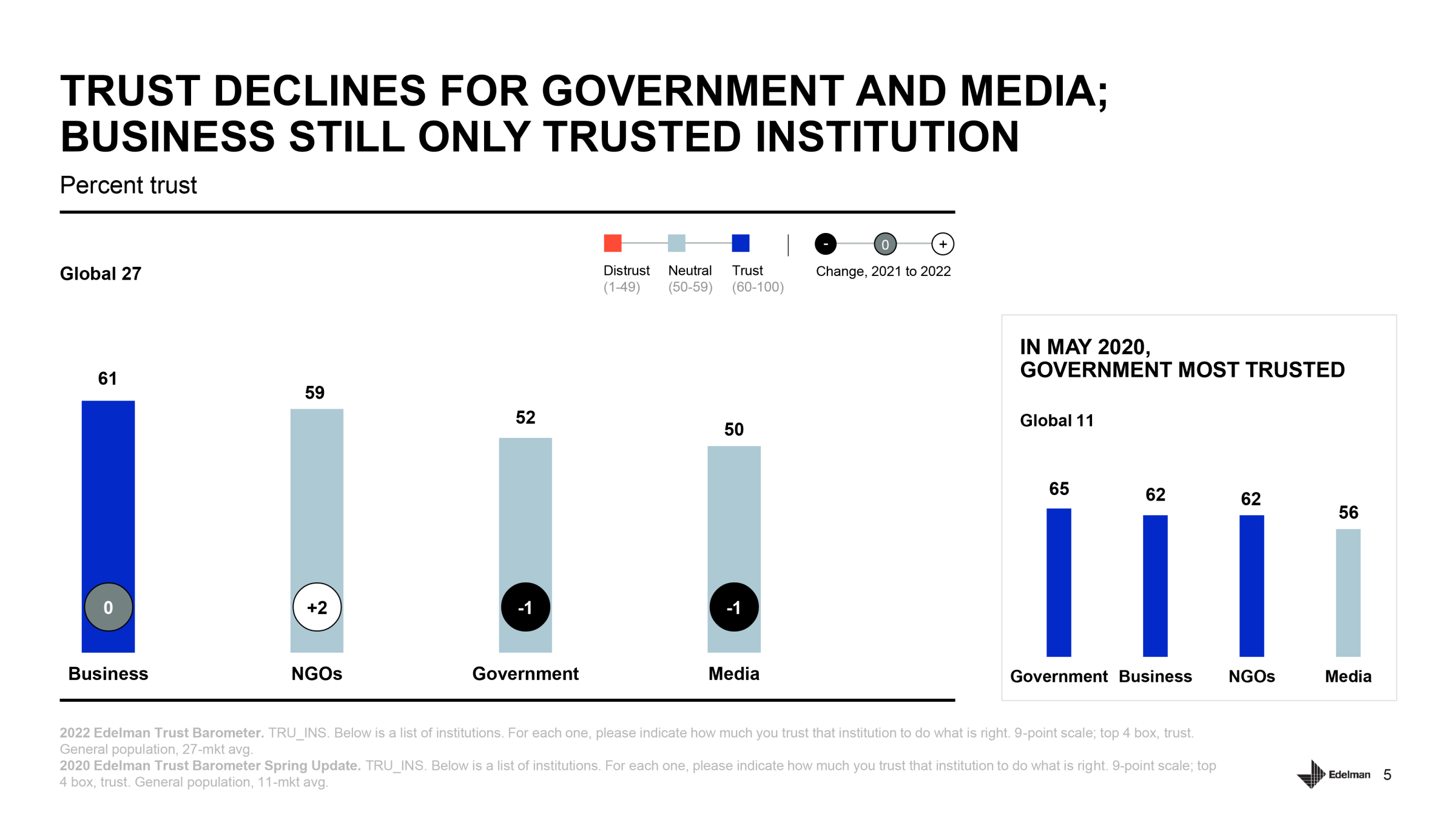
After another year marred by the COVID-19 pandemic and rapid spread of disinformation, a new report reveals that business leaders could be key to breaking out of “a vicious cycle of distrust fueled by government and media.”
The Trust Barometer, a study published annually by global communications firm Edelman, unveiled its findings on Tuesday after conducting more than 36,000 online surveys in 28 countries between Nov. 1 and Nov. 24, 2021. The firm found that public trust eroded even further in the past year among world governments and the media—largely due to mishandling of the pandemic, lack of progress on climate change and increased partisanship among media organizations. Yet, as companies develop vaccines and find cleaner energy sources, the report highlighted an increased desire for the private sector to play a larger role in addressing societal challenges, despite growing concerns about its commitment to social equity and workplace practices.
“Business must now be the stabilizing force delivering tangible action and results on society’s most critical issues,” CEO Richard Edelman said in a press release. “Societal leadership is now a core function of business.”

According to Edelman, every stakeholder group surveyed expects business to help “fill the void” on issues such as climate change, economic inequality, workforce reskilling and racial injustice. U.S. climate envoy John Kerry has already called on the private sector to help find solutions to climate change, in large part by funding the trillions needed for a global clean energy transition, and companies like Unilever and Alphabet have set goals to reduce their environmental footprints. These are positive signs, the report suggests, as trust in business was found to be higher than all other institutions. In an essay published alongside the report, Edelman explained that business leaders should continue taking active policy stances and serve as models of long-term thinking for other institutions.
Nearly 60% of the survey’s respondents also said they buy brands based on values, and nearly two-thirds of investors look to back businesses aligned with their values. However, the study found that the public considers non-governmental organizations (NGOs) to be the most ethical institutions, while businesses were found to be the most competent.
Meanwhile, Edelman wrote that government and media have entered a “distrust spiral” and are considered by the public to be neither ethical nor competent. Just under two years ago, prior to the start of the pandemic in 2020, the same survey found government to be the most trusted institution, at a time when the world sought leadership to stop the spread of the virus. A failure to do so, Edelman wrote, combined with “a stark partisan divide” in the news media has contributed to a rapidly decreasing level of trust among the public.
“The media business model has become dependent on generating partisan outrage, while the political model has become dependent on exploiting it,” he said. “Whatever short-term benefits either institution derives, it is a long-term catastrophe for society.”
Now, as governments bear those consequences, many are already predicting that outcome. Only 4 in 10 respondents say government can execute and achieve results, and the survey also found that people in every democracy studied believe they will be worse off financially in five years. In addition, Edelman says class divides became more apparent with this year’s survey: people with higher incomes were found to have slightly increased trust in public institutions, while trust among those with lower incomes either plateaued or plummeted, which Edelman attributes to the lack of job opportunities due to automation and inadequate working conditions for those holding frontline jobs.
Overall, the study concludes that business must fill the void left by government and deliver tangible actions while helping restore trust to all societal institutions, even though many private enterprises were not designed to fill this role. “As business steps up, we need to move from outrage to optimism, fears to confidence, insinuation to fact,” Edelman wrote.
More Must-Reads from TIME
- Cybersecurity Experts Are Sounding the Alarm on DOGE
- Meet the 2025 Women of the Year
- The Harsh Truth About Disability Inclusion
- Why Do More Young Adults Have Cancer?
- Colman Domingo Leads With Radical Love
- How to Get Better at Doing Things Alone
- Michelle Zauner Stares Down the Darkness
Write to Nik Popli at nik.popli@time.com